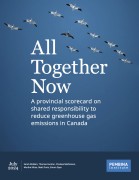This study examines the environmental impacts of the use of nuclear energy for electricity generation in Canada through each of the four major stages of nuclear energy production: uranium mining and milling; uranium refining, conversion and fuel fabrication; nuclear power plant operation; and waste fuel management. It is intended to inform public debate over the future role of nuclear energy in Canada, and to facilitate comparisons of nuclear energy with other potential energy sources.
The study concludes that no other energy source combines the generation of a range of conventional pollutants and waste streams - including heavy metals, smog and acid rain precursors, and greenhouse gases - with the generation of extremely large volumes of radioactive wastes, that will require care and management over hundreds of thousands of years. The combination of these environmental challenges, along with security, accident and weapons proliferation risks that are simply not shared by any other energy source, place nuclear energy in a unique category relative to all other energy supply options.
In the context of these impacts and risks, nuclear energy cannot be seen as a viable response to GHG emission problems associated with reliance on fossil fuels (e.g., coal) for electricity generation. In addition to the fact that nuclear power is not itself a GHG emission free energy source, a future path based on nuclear energy would simply replace one problem (GHG emissions) with a series of different, but equally unacceptable impacts and risks. These encompass everything from facility reliability and waste management to the potential for catastrophic accidents and nuclear weapons proliferation.









